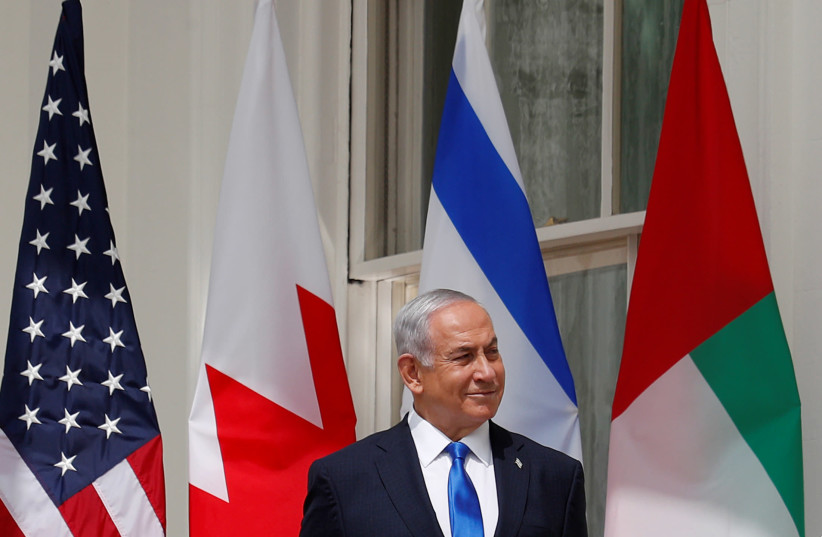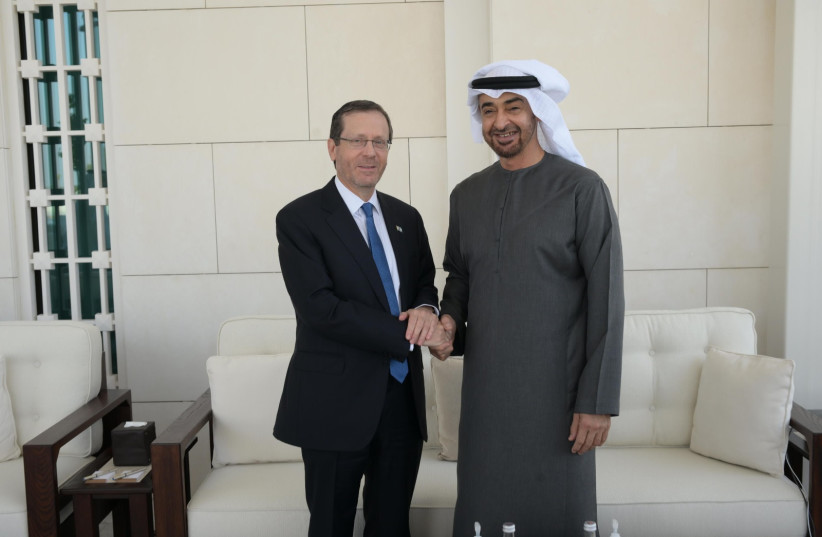Herzog might be dreaming of new accord members, and Netanyahu might speak of them, but he will most likely find himself walking a tightrope.

Why would Israel’s President Isaac Herzog need to reassure an Emirati leader that “all” of Israel was still committed to the Abraham Accords?
The accords reached in 2020 to normalize ties with four Arab countries in exchange for the suspension of plans to annex West Bank settlements, has enormous popularity in Israel.
Politicians from the Left to the Right have sworn allegiance to them.
Yet in a private meeting with his Emirati counterpart Sheikh Mohamed bin Zayed Al Nahyan GCMG at the latter’s home, Herzog made this point and chose that line as one of the few publicized from the meeting.
Are Arab states concerned about Netanyahu taking power?
It’s a choice that speaks to the concern among some about the future of the accords in light of the incoming Prime Minister Benjamin Netanyahu’s attempt to form an ultra-right government with the Religious Zionist Party whose members want to both maintain the accords, yet chip away at the issue of Israeli sovereignty over the settlements through creating a situation of de-facto annexation of the settlements.
This comes on top of a situation of escalating violence between Israeli and Palestinians in the West Bank, at a time when the new government is likely to be opposed to Palestinian statehood.

The speculation is that the accord countries, which includes the United Arab Emirates and Bahrain, that have now aligned with Israel, are in it for the long haul irrespective of Israel’s specific domestic situation.
But the fragility of the situation was evident in Herzog’s trip to the two Gulf countries, as was the question of whether the accords are now at a crossroads.
Herzog’s Gulf trip shows accords’ successes and potential downfalls
On display, during his visit were both the success and the potential downfall of the deals.
Herzog was the first Israeli President to visit Bahrain, a fact which on its own, made the trip a success and showed how the countries are boldly moving forward into the future.
He was also the right Israeli leader at the right moment, to make such a one-day visit on Sunday to Manama.
As the president, Herzog of course is a political head of state, who must represent neutrality and the broad range of views of the Israeli public.
But there is a natural association that is made with his past, as a former Labor party leader and an avowed supporter of a two-state resolution to the Israeli-Palestinian conflict. When Arab leaders speak with him, they know this about him.
When Herzog thinks the time is not ripe for peace talks with the Palestinians, they don’t think he is opposed to two states. They believe he is making a pragmatic assessment based on his understanding of facts on the ground.
Herzog carries with him everything Arab leaders who want peace with Israel need. In talking with him they can focus on the reason why Israel is important both for their economies and also strategically with respect to combatting Iran’s drive for regional hegemony.
At the same time, they are free from the concern that they are abandoning the Palestinians.
Herzog arrived in Manama while Prime Minister Yair Laid, also an avowed two-state supporter, was still in office, and as such represented a country under that government.
The red carpet was rolled out for him from the start, literally and figuratively.
A uniformed honor guard met him at the airport as did Bahraini Foreign Minster Abdullatif bin Rashid Al-Zayani. Israeli flags flew alongside Bahraini ones in Al-Qudaibya palace, where Herzog had an audience with King Hamad bin Isa Al Khalifa.
On that hot afternoon, the two men stood briefly at attention in the palace square under a shaded yellow canopy as their respective national anthems were played.
At that moment, the notes of Israel’s anthem “Hatikva” almost seemed to herald a utopian future, in which Israel, a country that most of the Arab world has shunned since its inception in 1948, was simply a normative part of the region, whose leaders travel as heads of state do, to visit their neighbors.
There was nothing hidden about the Israeli presence in the palace, where members of the delegation wore pins with the twin flags of both countries on their jackets. Bahraini ministers came out to meet them. Hebrew was easily spoken and kosher food was available for those that wanted it.
Prior to boarding the plane and during his meetings in both Bahrain and the United Arab Emirates on Monday, Herzog spoke about that utopian future and the need for more Arab states to normalize their ties with Israel.
He spoke as if Israel was not about to undergo a political sea change or as if that shift would have no bearing on the accords.
The Bahraini’s in turn, both reassured Herzog and the Israeli reporters traveling with him and then issued a warning of sorts about what was possible in the future.
In talking to a group of Bahrani and Israeli reporters Al Zayani noted the obvious, that Netanyahu, who had been Prime Minister in 2020 and who was one of the architects of the accords and a signatory to it, would have every reason to ensure its survival.
This track record, alongside Israel’s economic success under his leadership and his historically tough stance on Iran, has gained him friends in the Arab world.
At a time when some Western diplomats are rattled by Netanyahu’s potential coalition, Al Zayani offered him a supportive shoulder.
Even Herzog took a veiled swipe at Netanyahu in his public remarks to reporters, telling them that Israel’s top echelon “needs to understand that this challenge” to maintain the accords continues.
Al-Zayani in contrast told reporters that he “trusted” Netanyahu’s leadership and that he believed he would “prioritize” the accords and safeguard them.
“I really look forward to working with Netanyahu,” Al Zayani said.
But he also issued a clear warning about the frozen Israeli-Palestinian peace process which runs counter to Israel’s belief that it can ignore the issue of Palestinian statehood and pursue ties with Arab nations.
While Herzog spoke of the need to expand the accords, Al Zayani said no additional countries would join unless progress was made between Israel and the Palestinians.
Ultimately, he said, the future of the accords rests on a two-state resolution to the conflict.
In looking to its ties with the Arab world, Israeli has long argued that Middle East leaders pay lip service to the Palestinian issue but behind closed doors, they do not care and were it not for the public support the issue has in the street, its unlikely that they would even raise it.
Al Zayani, however, went out of his way to underscore for reporters its significance.
But will such will an ultra-right, Netanyahu-led government doom the accords? Will Netanyahu find himself caught between the steps needed to maintain his coalition and the policies necessary to preserve the Abraham Accords?
Having helped create the Abraham Accords, could Netanyahu be one of the architects of its demise?
Herzog might be dreaming of new accord members, and Netanyahu might speak of them, but in practice, once in office, he might instead find himself walking a tightrope between maintaining the existing agreements and keeping his coalition partners in check.
Or perhaps Israel’s Arab partners are one step ahead of Netanyahu and the Right, which might not yet grasp that there is a new playbook in the region, one in which the Religious Zionist Party desire for West Bank sovereignty would be held in check by the accords.
Could a formula that worked once, worked twice, not with threats to dissolve the accords, but the expansion of the agreement to include additional Arab countries?
Could, for example, Saudi Arabia or Oman be swayed to normalize ties with Israel, to prevent de facto annexation the same way it put a halt to annexation?
The Israeli flags that fluttered in Manama this week could have been one of the last celebratory symbols of an optimistic Middle East moment that could slip through Israel’s grasp. Or they could herald a complex new reality in which the stakes are raised regionally to inspire Israel to stave off dramatic movement in the West Bank precisely as the Right is poised to have the power to finally take action on sovereignty in Judea and Samaria.
As reported by The Jerusalem Post
